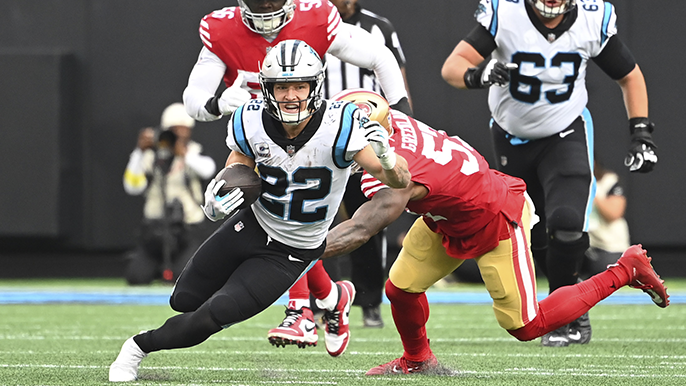
As exciting as trading for superstar running back Christian McCaffrey is, the blockbuster move doesn’t come without risk.
The 49ers pushed their chips in by sending their second, third and fourth round picks in the upcoming 2023 draft, plus a 2024 fifth rounder, to Carolina.
“You’ve gotta strike when the opportunity’s there,” San Francisco general manager John Lynch told reporters Friday. “It did take a lot to get him, but I think he’s worthy of that. He’s that kind of player.”
That’s for McCaffrey, who is electric when available but has missed 23 games in the past two years due to injury. Among players with at least 65 games played, only Hall of Famers Jim Brown, Terrell Davis and Barry Sanders have averaged more scrimmage yards than the former Panther.
Past results can be predictive of future ones. The track record of massive trades for running backs is spotty.
Here’s a brief, incomplete history lesson.
Herschel Walker (1989)
The biggest and most infamous trade in NFL history. What the Cowboys got in return for their Heisman Trophy-winning tailback remains staggering.
For Walker, two third-round picks, a fifth and a 10th, Minnesota sent five players, three draft picks and five additional picks conditional on cutting the players. Overall, Dallas ended up with three first round picks, three second round picks, a third and a sixth.
Dallas used those picks to draft Emmitt Smith and packaged others to acquire Charles Woodson, pro bowler Russell Maryland and a dizzying amount of additional picks. The trade led to a dynastic run in the 1990s that included three Super Bowl championships.
The Vikings made the trade thinking Walker would push their already strong roster over the top. They were wrong.
Minnesota never made it past the divisional round and Walker only spent two seasons with the Vikings, never making a Pro Bowl.
Verdict: Lol
Marshall Faulk (1999)
Coming off a season in which he set a career-high for scrimmage yards, Marshall Faulk wanted to renegotiate his contract. Instead, the Colts traded the then-24 year old to the St. Louis Rams in exchange for a second and fifth round pick.
Indianapolis selected linebacker Mike Peterson with the second and defensive tackle Brad Scioli with the fifth rounder. Neither starred but both made impacts.
Trading away Faulk also allowed Indianapolis to take Edgerrin James with their fourth overall pick and cede the offense to young quarterback Peyton Manning. The offense didn’t miss a beat.
Faulk, meanwhile, won the MVP in his second year with the Rams and finished second in MVP voting the years prior and after. He helped lead St. Louis to the Super Bowl in 1999 and contributed for seven seasons with the Rams.
Verdict: A rare win-win
Ricky Williams (1999)
To trade up to the No. 5 slot in the 1999 Draft, New Orleans sent all six of their picks, plus two of its first three picks in the 2000 Draft to Washington.
Williams struggled in his rookie year but put together back-to-back 1,000-yard rushing seasons in the next two. His and coach Mike Ditka’s relationship soured, leading to the end of Ditka’s career. New Orleans traded away Williams after three seasons.
Verdict: Don’t trade for running backs
Clinton Portis (2004)
Washington sent cornerback Champ Bailey and a second round pick to the Broncos for star running back Clinton Portis.
In Mike Shanahan’s offense, Portis had rushed for over 3,000 yards in two seasons. He made a Pro Bowl team with Washington but never returned to his ridiculous 5.5 yards per carry.
Bailey, meanwhile, became one of the best cornerbacks in NFL history. The Broncos also used the draft pick to select running back Tatum Bell, who became a 1,000-yard rusher.
This trade isn’t as similar as the McCaffrey deal because it involved a player and only one draft pick, but aggressively acquiring a star running back was foolish.
Verdict: The Broncos clearly won the trade.
Marshawn Lynch (2010)
In exchange for Marshawn Lynch, the Seattle Seahawks traded a 2011 fourth round pick and 2012 fifth rounder. The price was low because of Lynch’s many off-field issues.
With a fresh start in Seattle, Lynch starred. He was a four-time Pro Bowler and helped Seattle win the Super Bowl in 2013.
Buffalo, meanwhile, hhanded the backfield keys to Fred Jackson and C.J. Spiller. With the draft picks, the Bills chose tackle Chris Hairston and linebacker Tank Carder. Neither panned out.
Verdict: Trading for a running back definitely works (sometimes)
Trent Richardson (2013)
Two games into the 2013 season, the Browns traded running back Trent Richardson to the Colts for a 2014 first rounder.
Richardson had a strong rookie season, and the Colts wanted to pair him with fellow 2012 draftee Andrew Luck.
The bet didn’t work. Richardson flamed out after 29 games and never played again. He recorded 3.1 yards per carry.
Cleveland flipped the 2014 first rounder to move up in the draft and select quarterback Johnny Manziel. It was a disaster all around.
Verdict: Lose-lose.

